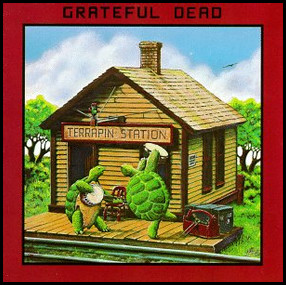
Terrapin Station is the ninth studio album by the Grateful Dead, and was originally released on July 27, 1977.
This album was the first time since Anthem Of The Sun that the Grateful Dead used an outside producer. This is also the first Grateful Dead album on the Arista label after releasing other albums (1973-1976) on its own Grateful Dead Records.
According to Dennis McNally, Jerry Garcia conceived the idea for the song "Terrapin Part One" while driving across the Richmond-San Rafael Bridge.
The album was released for the first time on CD in 1986, then remastered and rereleased in 1987 both by Arista Records before being re-released in 2000 by BMG International. It was then remastered, expanded, and released as part of the Beyond Description (1973-1989) box set in October 2004 with studio outtakes and live songs. The remastered version was later released separately on CD on March 7, 2006 by Rhino Records. All the CD versions feature the single version of Dancin' In The Streets with horns whereas the original album version of Dancin' didn't have the horns.
The album incorporates a more symphonic sound bordering on progressive rock styles that were expressed earlier by progressive art rock groups like Yes and Genesis. This was considered by fans to be a major departure from the more jazz-blues and traditional folk styles used by the Grateful Dead earlier in their career, although these elements are still present here. The title track uses strings and a choir to evoke a tighter and more complex structure as opposed to their looser improvisational works. Horns are also employed extensively to "funk up" their sound.
The Grateful Dead played the first two parts of Terrapin Station, and the songs "Estimated Prophet" and "Samson and Delilah" in concert rotation until the end of their career, usually as part of the second set. "Terrapin" was played live some 302 times starting on February 26th 1977 at the Swing Auditorium in San Bernardino, California.
Reaction to the album was mixed as many fans thought that it was overproduced and not in keeping with the Grateful Dead's more unpolished free-form style, while others believe it to be their greatest musical achievement.
The song, "Lady with a Fan" was co-written by Robert Hunter and Jerry Garcia. Robert Hunter said of the song, "I wrote Terrapin Part One" at a single sitting in an unfurnished house with a picture window overlooking San Francisco Bay during a flamboyant lightning storm. I typed the first thing that came into my mind at the top of the page, the title: Terrapin Station."
"On the same day, driving to the city, Garcia was struck by a singular inspiration. He turned his car around and hurried home to set down some music that popped into his head, demanding immediate attention."
"When we met the next day, I showed him the words and he said, "I've got the music." They dovetailed perfectly and Terrapin edged into this dimension."
Songs[]
- "Estimated Prophet" (Barlow, Weir) – 5:37
- "Dancing In The Street" (Gaye, Hunter, Stevenson) – 3:18
- "Passenger" (Lesh, Monk) – 2:48
- "Samson and Delilah" (Traditional) – 3:29
- "Sunrise" (Godchaux) – 4:08
- "Terrapin Station Part 1" (Garcia, Hunter, Hart, Kreutzmann) – 16:29
- "Peggy-O" (11-2-76 instrumental studio outtake) (traditional) – 4:41
- "The Ascent" (11-2-76 instrumental studio outtake) – 1:59
- "Catfish John" (Fall '76 studio outtake) (McDill, Reynolds) – 4:43
- "Equinox" (2-17-77 studio outtake) (Lesh) – 5:15
- "Fire on the Mountain" (studio outtake) (Hart, Hunter) – 6:26
- "Dancing in the Street" (5-8-77 Live at Barton Hall Cornell University, Ithaca, NY) (Gaye, Hunter, Stevenson) – 16:17
Reissue production credits[]
- David Lemieux, James Austin - reissue producers
- Reggie Collins - annotation
- David Gans - liner notes
- Sheryl Farber - editorial supervision
- Cameron Sears - executive producer
- Dave Devore - engineer
- Tom Flye - mixing
- Robert Gatley - mixing assistant
- Mary Ann Mayer - art coordinator
- Jimmy Edwards, Robin Hurley, Hale Milfgrim, Scott Pascucci - associate producer
- Joe Gastwirt - mastering, production consultant
- Eileen Law - research
- Ed Perlstein, Robert Minkin, Richard McCaffrey, Peter Simon, Cornelius "Snookey" Flowers - photography
- Hugh Brown, Steve Vance - design, reissue art directors
- Steven Chean, Bill Inglot, Jeffrey Norman, Randy Perry, Mark Pinkus - project assistants